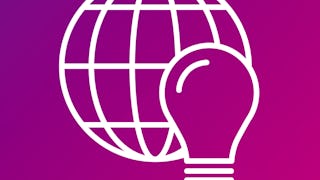In this course, you’ll learn the foundational economic theories behind health care innovation and how to optimize your own health care practice or organization. Designed to help you gain a practical understanding of innovation techniques, operations management, and value and quality in the health care setting, this course will help you apply these frameworks to assess health care practices and apply innovation while managing risk. You’ll also explore the best practices for evaluating one’s innovative practices, using real-life examples of success to see the concepts in action. By the end of this course, you’ll have honed your skills in optimizing health care operations, and be able to develop the right set of evaluations and questions to achieve best innovative practices within your organization.



Health Care Innovation
This course is part of The Business of Health Care Specialization



Instructors: Amber Bird
11,885 already enrolled
Included with 
(302 reviews)
Skills you'll gain
Details to know

Add to your LinkedIn profile
3 assignments
See how employees at top companies are mastering in-demand skills

Build your subject-matter expertise
- Learn new concepts from industry experts
- Gain a foundational understanding of a subject or tool
- Develop job-relevant skills with hands-on projects
- Earn a shareable career certificate

There are 3 modules in this course
<strong>Important Program Note: </br>A revised course version is set to launch on or near July 1, 2025. If you are a student with late work, deadlines will be reset and the content will be updated.</strong></br></br>Wharton professor, Christian Terwiesch welcomes you to the course, then Profs. Sarah Rottenberg and Roy Rosin focus on the discovery phase of the innovation process. Prof. Rosin discusses strategies—including ethnography or contextual inquiry—for gaining insight into the scope and parameters of challenging problems. He introduces a framework for crafting an effective hypothesis. And Prof. Rottenberg explores techniques for seeing and documenting what others have missed.
What's included
11 videos1 assignment
In this module, Prof. Terwiesch explains foundational concepts of health care operations and ways to use them to optimize health care delivery. You will examine the provider-patient relationship and learn how a different types of performance metrics can improve patient-facing performance measures. You will enumerate various types of inefficiency, such as waste, variability, and inflexibility. You will learn techniques to optimize performance and service by gauging flow rate, flow time, and inventory. And you will learn to map health care processes. By the end of this module, you will be equipped to analyze the financial viability of a health care provider using and create a framework to assess and optimize performance.
What's included
9 videos1 assignment
In this module, Drs. Neha Patel and Lee Fleisher define value, survey methods for assessing value and quality, and introduce the organizations that set quality standards. Dr. Fleisher and guest presenter Dr. Amber Bird explain the importance of health equity and social determinants of health in determining quality of care, patient experience, and patient outcomes. Dr. Fleisher also examines acute care at home, and opportunities for artificial intelligence.
What's included
8 videos1 assignment
Earn a career certificate
Add this credential to your LinkedIn profile, resume, or CV. Share it on social media and in your performance review.
Instructors

Offered by
Explore more from Healthcare Management
 Status: Free Trial
Status: Free TrialUniversity of Michigan
 Status: Free Trial
Status: Free TrialImperial College London
 Status: Free Trial
Status: Free TrialImperial College London
 Status: Free Trial
Status: Free TrialImperial College London
Why people choose Coursera for their career




Learner reviews
302 reviews
- 5 stars
68.87%
- 4 stars
23.17%
- 3 stars
5.29%
- 2 stars
0.99%
- 1 star
1.65%
Showing 3 of 302
Reviewed on Feb 8, 2023
More time and details would be highly appreciated, instead of rushing through the complicated concepts
Reviewed on Nov 7, 2019
I found the course helpful overall, I found the 3rd module to be the most difficult and hard to follow and felt there was a lot of information without real world examples.
Reviewed on Apr 30, 2020
as a physician it helped a lot to understand human behaviors with health choices . it was a great course

Open new doors with Coursera Plus
Unlimited access to 10,000+ world-class courses, hands-on projects, and job-ready certificate programs - all included in your subscription
Advance your career with an online degree
Earn a degree from world-class universities - 100% online
Join over 3,400 global companies that choose Coursera for Business
Upskill your employees to excel in the digital economy
Frequently asked questions
Access to lectures and assignments depends on your type of enrollment. If you take a course in audit mode, you will be able to see most course materials for free. To access graded assignments and to earn a Certificate, you will need to purchase the Certificate experience, during or after your audit. If you don't see the audit option:
The course may not offer an audit option. You can try a Free Trial instead, or apply for Financial Aid.
The course may offer 'Full Course, No Certificate' instead. This option lets you see all course materials, submit required assessments, and get a final grade. This also means that you will not be able to purchase a Certificate experience.
When you enroll in the course, you get access to all of the courses in the Specialization, and you earn a certificate when you complete the work. Your electronic Certificate will be added to your Accomplishments page - from there, you can print your Certificate or add it to your LinkedIn profile. If you only want to read and view the course content, you can audit the course for free.
If you subscribed, you get a 7-day free trial during which you can cancel at no penalty. After that, we don’t give refunds, but you can cancel your subscription at any time. See our full refund policy.
More questions
Financial aid available,




